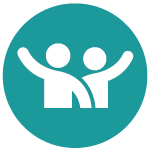RES’EAU-WaterNET, a program started by Dr. Madjid Mohseni, originally from Iran, has helped 4 First Nations communities lift drinking water advisories and 8 small communities improve the quality of their drinking water.
Engineering cleaner water in remote communities
July 25, 2019
Share:
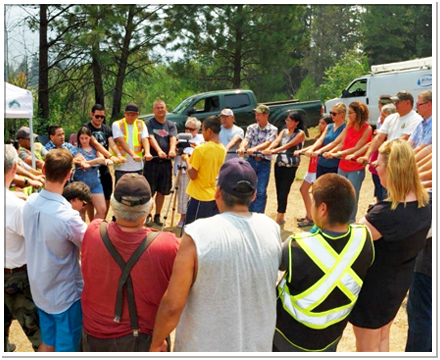
A community circle with members of the Lytton First Nation. Photo credit: RES’EAU
Drinking water advisories have been common in remote and Indigenous communities in Canada for decades. Reasons range from water line breaks, to equipment failure, to poor filtration or disinfection. Sometimes emergency repairs are needed, or there are too few staff to support a plant’s operation.
In November 2015, there were more than 100 long-term drinking water advisories (in place for more than a year) in effect in Indigenous communities across Canada. By July 2019, there were 58 remaining.
Part of that progress, especially in British Columbia, is thanks to Dr. Madjid Mohseni, a University of British Columbia (UBC) engineering professor, working together with Indigenous communities. Madjid is the founder of and driving force behind RES’EAU-WaterNET, a research initiative that brings together water technology engineers, chemists, economists, science policy experts and industry partners to work with small, remote and Indigenous communities to develop customized water-treatment solutions.
Originally from Iran, Madjid came to Canada as an international student in the 1990s, eventually earning his Ph.D. and joining UBC as faculty. Around 2005, the problem of persistent drinking water issues in remote communities appeared on his radar, and he began to brainstorm possible solutions. By 2008, his efforts had led to a funding application with the Natural Sciences and Engineering Research Council of Canada (NSERC).
Dr. Mohseni is a leader in integrating Truth and Reconciliation efforts into engineering education. He makes a lot of effort to learn about [First Nations] culture. He shows respect and listens to their concerns.
Danny Higashitani, senior engineer, Indigenous Services Canada
RES’EAU was launched in 2009 as a public-private partnership. Its initial funding was $14 million, with 70% coming from NSERC and the balance from organizations. Madjid says that getting the program up and running required commitment, hard work, networking and brainstorming. In all, it took 3 years to get everyone on board.
Rather than imposing a “one size fits all” solution everywhere, RES’EAU focuses on what it calls the Community Circle Model. This brings local residents and experts together to choose solutions that reflect individual communities’ needs, resources and capacities.
An example is the Nickeyeah Community of the Lytton First Nation within the Thompson-Nicola Regional District. The community was under a drinking water advisory for years until a permanent water treatment plant was installed in 2016 with support from RES’EAU. The plant was fabricated off-site and delivered by truck for less than half the cost quoted by other suppliers.
Madjid encourages his graduate students to think about incorporating reconciliation efforts into projects. Over the last decade, more than 180 engineering students, from undergraduate to doctorate, have participated in RES’EAU projects.
Irfan Gehlen, a senior specialist in water supply and treatment with Kerr Wood Leidal Engineering, a RES’EAU partner, says working with RES’EAU has a huge impact on students. “Acquiring hands-on experience with Indigenous communities helps them develop greater cultural awareness and competencies”, he says. These are essential for engineers working on natural resource projects.
For his part, Madjid appreciates the diverse perspectives his work exposes him to. “I really enjoy working with First Nations people – they are fantastic and so welcoming”, he says. “I learn a lot about the value of life, seeing things from their perspective”.
Immigration profile: Thompson-Nicola Regional District, British Columbia
Quick facts:
- Immigrants make up more than 9% of Thompson-Nicola’s population.
- More than half (52%) of all immigrants who came to Thompson-Nicola between 1980 and 2016 were economic immigrants, while 42% were sponsored by family and nearly 6% were refugees.
- Immigrants make up 24% of the national workforce but account for 39% of computer programmers, 41% of engineers and more than 50% of all chemists.
Did you know?
- Many international students enrolled in STEM fields will stay and build their careers in Canada, enhancing our capacity for innovation and helping us build a stronger economy for the future. Read more about what immigration does for our country.
You may also be interested in ...
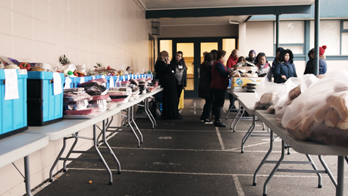 Fighting food waste while feeding the
community
Fighting food waste while feeding the
community
A Serbian immigrant and his enthusiastic group of volunteers gather unsold food for people in need in Coquitlam.
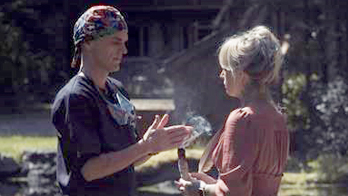 Healing from the heart
Healing from the heart
Dr. Riaan van der Wart blends traditional and contemporary medicine to serve First Nations communities.
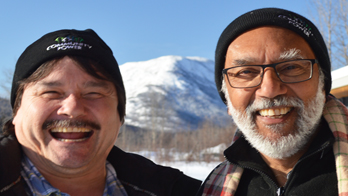 Empowering communities to save money and
energy
Empowering communities to save money and
energy
Areef Abraham is working with Indigenous communities to be more energy efficient, one home at a time.

Page details
- Date modified:




